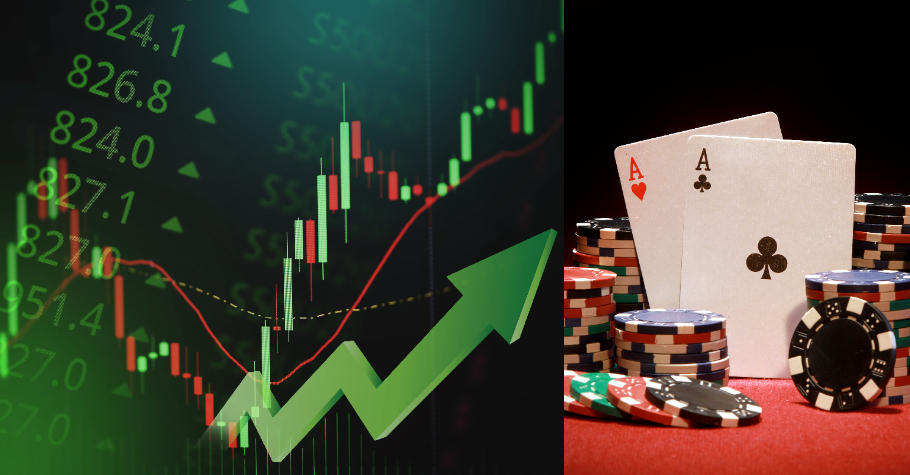In the realm of financial markets, a debate persists regarding the nature of trading – is it a calculated risk-taking endeavor or merely a form of gambling?
This article aims to critically examine this question, drawing on analytical insights and objective analysis.
By exploring the role of risk in trading, analyzing market trends MMC996, and highlighting strategies for success, we will shed light on the key differentiators between trading and gambling.
In doing so, we will empower readers with the knowledge necessary to navigate the complexities of the trading landscape.

The Role of Risk in Trading
Risk is an inherent aspect of trading that must be carefully managed and understood to achieve long-term success. Traders are constantly exposed to various risks, such as market volatility, economic uncertainties, and unexpected events. To mitigate these risks, traders employ various risk management techniques to protect their capital and ensure profitability.
One of the key risk management techniques is diversification. By spreading their investments across different assets, traders can minimize the impact of any single market or sector downturn. This strategy helps to reduce the overall risk exposure and provides a buffer against potential losses.
Another important aspect of risk management is setting stop-loss orders. These orders automatically close out a trade when a certain predetermined price level is reached. By implementing stop-loss orders, traders can limit their potential losses and protect their capital from significant drawdowns.
Furthermore, psychological factors play a crucial role in trading and risk management. Emotions such as fear, greed, and overconfidence can lead to irrational decision-making and poor risk management. Successful traders understand the importance of maintaining discipline and objectivity in their trading strategies, as well as managing their emotions effectively.
Analyzing Market Trends and Patterns
Market analysis involves the careful examination of trends and patterns to make informed investment decisions. Traders employ various methods to analyze markets, including technical analysis and fundamental analysis.
Technical analysis focuses on studying historical price and volume data to identify patterns and trends that can help predict future price movements. Traders who use technical analysis rely on indicators, such as moving averages, trend lines, and chart patterns, to make trading decisions.
On the other hand, fundamental analysis involves evaluating the intrinsic value of an asset by examining factors such as financial statements, industry trends, and macroeconomic data. Fundamental analysts believe that the market may misprice assets, and they aim to identify undervalued or overvalued securities.
Both technical and fundamental analysis have their merits and limitations. Technical analysis is mainly concerned with short-term price movements and can be useful for short-term traders, while fundamental analysis provides a broader perspective and is more suitable for long-term investors.
Traders often use a combination of both approaches to gain a comprehensive understanding of the market and make more informed investment decisions.
Strategies for Successful Trading
One key strategy for successful trading is having a well-defined and disciplined approach to managing one’s portfolio. In the fast-paced and unpredictable world of trading, psychological factors play a crucial role in determining one’s success. Managing emotions is an essential aspect of trading that can greatly impact one’s decision-making process.
Emotions such as fear and greed can cloud judgment and lead to impulsive and irrational trading decisions. Successful traders understand the importance of keeping emotions in check and maintaining a rational mindset. They develop strategies to manage these psychological factors and stay focused on their long-term goals.
One effective technique for managing emotions is to establish clear trading rules and stick to them. This helps traders avoid impulsive actions driven by emotional responses to market fluctuations. By following a well-defined plan, traders can reduce the influence of psychological factors and make more objective decisions based on market analysis and strategy.
Additionally, maintaining discipline and practicing self-control are essential for successful trading. This involves setting realistic expectations, managing risk effectively, and not letting emotions dictate trading decisions. Traders who can control their emotions and maintain discipline are better equipped to navigate the uncertainties and volatility of the market.

The Importance of Education and Knowledge in Trading
Education and knowledge are essential factors for achieving success in the world of trading, as they provide traders with the necessary skills and understanding to navigate the complexities of financial markets. In the realm of trading, the psychology of trading plays a crucial role in determining a trader’s success or failure. Understanding the psychology behind trading can help traders make rational decisions and manage their emotions effectively, which is essential in a high-pressure environment like the financial markets.
Furthermore, traders need to have a solid foundation in both technical and fundamental analysis. Technical analysis involves studying past price and volume data to identify patterns and trends, which can help traders make predictions about future price movements. On the other hand, fundamental analysis focuses on analyzing the financial health and performance of companies, industries, and economies to determine the intrinsic value of an asset.
Having a comprehensive understanding of both technical and fundamental analysis allows traders to make informed decisions based on a combination of historical data and current market conditions. It enables them to identify potential opportunities and risks, and to develop effective trading strategies that align with their goals and risk appetite.
Differentiating Between Gambling and Trading
Differentiating between speculation in financial markets and a game of chance requires a careful analysis of risk management, market analysis, and informed decision-making. While both trading and gambling involve the potential for financial gain or loss, they differ significantly in terms of strategy, skill, and risk assessment.
Trading, unlike gambling, is a systematic and disciplined approach to participating in financial markets. Traders employ various techniques and tools to analyze market trends, assess risk, and make informed decisions based on market data. They aim to profit from fluctuations in prices by buying and selling financial instruments such as stocks, bonds, or currencies. This requires a deep understanding of market dynamics, economic indicators, and technical analysis.
On the other hand, gambling relies primarily on chance and luck. In games of chance, such as roulette or slot machines, the outcome is determined by random events that are beyond the player’s control. While there may be some strategies or systems that can improve the odds, ultimately, the result is unpredictable and uncontrollable.
Understanding market volatility is crucial in differentiating trading from gambling. Volatility refers to the degree of variation in price movements. Traders recognize that market volatility presents opportunities for profit, as well as risks. They carefully manage their exposure to market fluctuations by implementing risk management strategies, such as setting stop-loss orders or diversifying their portfolios. In contrast, gamblers often ignore or underestimate the impact of volatility, as they rely on luck rather than analysis and risk management.
Conclusion
In conclusion, while trading and gambling may share some similarities, it is crucial to differentiate between the two.
Trading involves the analysis of market trends, patterns, and the implementation of strategies to maximize profits and minimize risks. With a focus on education, knowledge, and objective decision-making, trading can be a disciplined and profitable endeavor.
On the other hand, gambling relies more on chance and luck, lacking the systematic approach and long-term sustainability of trading.
